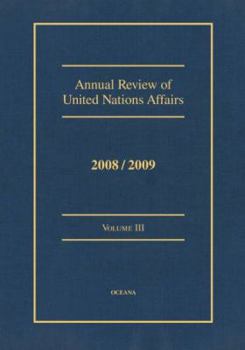Annual Review of United Nations Affairs 2008/2009, Vol. 3
a. The set generally Since the publication of its first edition in 1950, the Annual Review of United Nations Affairs has stood as the authoritative resource for scholars, students, and practitioners researching the latest developments of that august body. From the insightful introduction, prepared each year by a distinguished expert on UN affairs, to the full-text presentation of reports and resolutions and the helpful subject index, ARUNA provides a practical tour of each year's U.N. actions and debates. The expert selection of documents by Joachim Muller and Karl Sauvant and the topic-based organization of those documents make any researcher's task much easier than the vast searching, sorting, and pruning required by the U.N.'s website. The series' topic-based organization of the materials and subject index lend invaluable guidance to all researchers. ARUNA presents a comprehensive documentation of the work of the UN on an annual basis, starting in September of each year with the beginning of the regular sessions of the General Assembly. Coverage of the UN's key organs is provided, including the General Assembly, the Security Council, the Economic and Social Council (ECOSOC), the International Court of Justice, and the UN Secretariat. In addition, selected reports of intergovernmental bodies and expert groups are included. Solely official UN documentation is used. ARUNA occupies a special place in the publications on the work of the UN--it allows readers to obtain an overview of the principal developments in its key organs. This makes it an important reference source for policy-makers and academic researchers. b. The 2008-2009 volumes The highlight of this year's edition is the introductory essay written by the highly esteemed Jose Antonio Ocampo, who is Professor of Professional Practice in International and Public Affairs, Director of the Program in Economic and Political Development at the School of International and Public Affairs, and Fellow of the Committee on Global Thought, Columbia University. Professor Ocampo previously held the positions of Under-Secretary-General of the United Nations for Economic and Social Affairs, Executive Secretary of the United Nations Economic Commission for Latin America and the Caribbean, and Minister of Finance of Colombia. In 2009, he was a member of the Commission of Experts of the President of the United Nations General Assembly on Reforms of the International Monetary and Financial System. Professor Ocampo is also the author of numerous books and articles on macroeconomics policy and theory, economic development, international trade, and economic history. His recent publications include Stability with Growth: Macroeconomics, Liberalization and Development, with Joseph E. Stiglitz, Shari Spiegel, Ricardo Ffrench-Davis and Deepak Nayyar (New York: Oxford University Press, 2006). Professor Ocampo, relying on his expertise as a policy economist and his own considerable experience working on economic issues at the United Nations, has written an incisive introductory essay focusing on the United Nations and the global economic crisis. Professor Ocampo's essay examines the history of the economic policy recommendations of UN institutions and concludes that they have often been more far-sighted and accurate than those of the Bretton Woods Institutions, including the World Bank and the International Monetary Fund. He applies this analysis in particular to the recent global financial crisis, and shows how the Monterrey Consensus of 2002, which once again made the UN a forum for global economic issues, gave serious consideration to the concerns of developing countries and set many goals that might have helped to stave off the global financial crisis if they had been more actively pursued. Professor Ocampo also examines the UN's role in the wake of the global financial meltdown, particularly with regard to the Doha follow-up Conference and the Commission of Experts on Reforms of the International Monetary and Financial System, convened by the General Assembly and led by Joseph Stiglitz. In spite of some resistance to these initiatives from the United States and other developed countries, Professor Ocampo advocates in this essay for a more influential role for the UN's institutions in global financial reform, especially in light of their superior track record in anticipating economic problems resulting from the inherent tendency of financial markets to experience boom-bust cycles. The 2008-2009 volumes of ARUNA therefore also devote considerable attention to the financial crisis as well as other international crises. Among the documents in the 2008-2009 volumes are the complete General Assembly resolutions, as well as the Report and Resolutions of the Security Council and the Economic and Social Council (ECOSOC). Annual Reports of note include reports of the United Nations Children's Fund (UNICEF), the UN Development Programme and UN Population Fund, the UN High Commissioner for Human Rights, the UN High Commissioner for Refugees, the UN Relief and Works Agency for Palestine Refugee in the Near East, and the World Food Programme. Mr. Muller and Dr. Sauvant have also selected progress reports on key peacekeeping, peace-building, and political missions, including those for Afghanistan, the Democratic Republic of the Congo, Haiti, Iraq, Kosovo, the Middle East, Somalia, Sudan, and West Africa. c. Volume III (this volume) This volume contains the following: Chapter 1: General Assembly, Sixty-third Session (continued) D. Resolutions adopted by the General Assembly at its sixty-third session (continued) (Resolutions 63/249 through 63/311) Chapter 2: Security Council A. Report of the Security Council, 1 August 2008-31 July 2009, A/64/2 (Supplement No. 2), 2009 d. Guest Authors of previous years' editions Each annual edition of ARUNA is introduced by a Guest Author, a distinguished expert on UN affairs, who
Format:Hardcover
Language:English
ISBN:0195397991
ISBN13:9780195397994
Release Date:April 2010
Publisher:Oxford University Press
Length:468 Pages
Weight:2.09 lbs.
Dimensions:7.1" x 1.2" x 10.1"
Related Subjects
LawCustomer Reviews
0 rating





